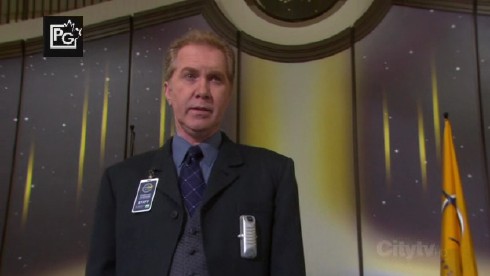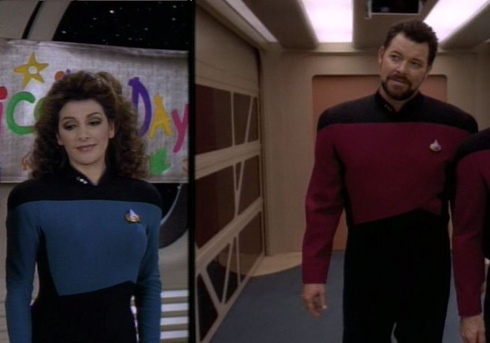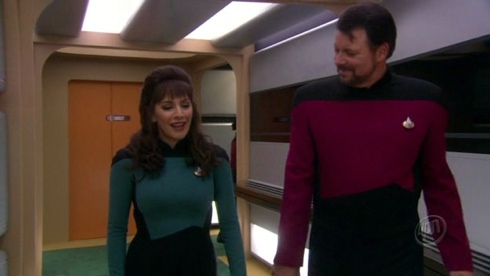It’s sad, really — for a show meant to continue the fine tradition of boldly going where no man has gone before (or no one, in the more politically-correct TNG era), all Enterprise managed to do was boldly go where no Trek series had gone before.
Straight into the tank.
I started watching Enterprise when it debuted, gave up midway through the first season (when I discovered that first-season TNG was a far better show), then ignored it until I started hearing rumors that this last season was actually watchable. I’ve been using bittorrent to watch season four, and while it’s admittedly better than the first season…well, really, it doesn’t take much to be better than the first season.
Tonight I finished things off, watching the end of the two-part arc following the derailment of the first effort at laying the foundation for the future United Federation of Planets, then following that up with the final episode of Enterprise.
(SPOILERS follow, if you care.)
First things first: while the two episodes immediately preceding the finale were decent — though I’d hesitate to collectively rate them any better than that (individually, the first half was definitely the better of the two) — the single biggest thing that stuck in my mind after watching them?
It’s really hard to take the leader of Earth’s government seriously when you’re expecting him to at any moment suddenly morph into a giant demon snake and start munching delegates right and left.

Nothing against actor Harry Groener, of course, but his role as Sunnydale’s Mayor Wilkins in Buffy has been so indelibly burned into my brain that it was all I could do to keep from giggling when he first appeared on screen.
As for Enterprise’s finale episode…meh. I’d say a big “meh,” except that “meh” is such an apathetic term of disgust that give it any sort of emphasis is rather oxymoronic.
First off, it wasn’t really an Enterprise episode, but rather a TNG episode with a lot of Holodeck re-enactments of events set at the end of Enterprise’s 10-year mission (six years after the last actual episodes we saw) and around the signing of the accord that forms the alliance that would eventually grow into the UFP. While it’s kind of nice to see Riker and Troi walking the corridors of NCC-1701-D again…it just doesn’t feel right as an end to this series. Rather, it comes off as last, final, desperate ploy by the Powers that Be to do anything possible to drag a few more viewers to the show.
Secondly, the TNG-era framing story for this episode is set during the events of the seventh season TNG epsiode The Pegasus. Without meaning any disrespect to either Marina Sirtis or Jonathan Frakes, it’s been around eleven years since The Pegasus was filmed, and while they’re both aging well, they’re not exactly identical to their appearance a decade ago. I could even have forgiven that for the sake of the story (though it would have been easier if the overall story was better), but apparently the makeup artists didn’t even bother to reference The Pegasus for this Enterprise episode.
Here we have a screencap (actually a composite of two screencaps) from The Pegasus:
And here we have a screencap from These are the Voyages…:
Minor things like the ten years of aging aren’t really terribly obvious. Marina’s face has thinned out a bit, and they’re both slightly heavier than they were during TNG’s run, but that’s not really that big of a deal. Amusingly, though, it means that Troi is actually curvier now than she was at the time (compare the shadows underneath her bust, for example), and I remember how much grumbling there was about her being little more than Trek’s version of T&A (that being Tits and an Accent). Of course, 7 of 9 and T’Pol were far more blatant about appealing to the teenage male demographic that way, but back in the TNG days, poor Troi got a lot of ribbing about being little more than eye candy.
More blatantly, though, is that the hairstyle is just wrong for both of them. Apparently when they’re not busy dealing with intragalactic incidents, the crew of NCC-1701-D spent all their free time in the hair salon. Troi is sporting a straighter, more natural hairstyle far closer to what she had in the movies than the heavily permed style of the original show, while Riker’s hair is less slicked back and comes complete with a Superman-style forelock falling across his forehead.
Nitpicking? Sure, and I’ll freely admit it. But if they’re going to not just pander to the old TNG fans by bringing back Troi and Riker, but actually place their framing story within an already existing episode, you’d think they could take a few minutes to pop the DVD in and do their best to match the actors appearances.
But then, given Enterprise’s notorious disregard for Trek canon, I suppose that this wasn’t really that much of a surprise.
Anyway. Continuing on.
Bringing Shran back for the rescue of his daughter seemed to serve two purposes only: to bring back one of the few interesting characters Enterprise has produced (and to give Jeffrey Combs — a fan favorite, and quite deservedly so, in my opinion, I’ve enjoyed all of the characters he’s played — one last star turn); and to come up with an excuse to waste half the hour on pointless “action”.
Oh, and to set up Trip’s demise…which, amazingly enough, actually comes across as even more pointless than Kirk’s death in ‘Generations’. At least when Kirk died he was trying to save his career the galaxy from a madman. Trip died so that Archer wouldn’t miss a speech. Oooh. Quite the noble sacrifice, that.
And speaking of the speech — we don’t even see it! We finally get to the historic moment when the charter establishing the alliance between Earth, Vulcan, Andoria, and Tellar Prime, Archer strides to the stage to make what we’re told is a historic speech…and Riker tells the Holodeck to “end program” and he and Troi stride out onto the corridors of the Enterprise D.
Meh.
Other random observations before I end this little rant…
- I’m sorry, Quantum Leap fans, but Bakula has never impressed me. Truth to tell, his intentional overacting and chewing of the scenery in the Mirror Universe episodes of a few weeks ago doesn’t really seem that different to me than his normal portrayal of Captain Archer. Plus, considering that he just senselessly lost one of his closest friends, his face never lost the bemused little “I can’t believe I’m getting paid for this tripe” smirk after Trip’s death. Does he have other expressions?
-
What was T’Pol doing after Archer hugged her? I could understand her being a little uncomfortable with this sudden show of affection, but…she just kind of wobbles. She holds her right hand out at an odd angle, and gives a slight, unsteady sway from the hips up. It’s really, really odd.
-
Did nobody on the NX-01 ever get promoted or change their jobs in the slightest over the ten years that the ship was in service? When the show opened Mayweather was at the helm, Sato was at the communications station, Reed was doing whatever he does…and ten years later, they’re all in exactly the same place (well, okay, Trip moved to Engineering…then died). No advancement? No promotions? How incredibly boring. The crew of the Enterprise-D at least showed a little motivation, changed things up, and actually grew over time. As far as this last episode shows, the crew of the NX-01 was depressingly static.
-
Wasn’t anyone curious or concerned about how the bad guys who everyone thought were limited to Warp 2 — Shran even mentions that his shuttle should be able to easily outrun them at Warp 4 — were somehow able to catch up to a top-of-the-line Starfleet ship running at Warp 7, engage it in battle, and board it without any real trouble at all?
Meh.
I wish the head of Earth’s government had turned into a giant demon snake and started munching on people. Right during the signing ceremony. Start with Archer, then finish off the rest of the Enterprise crew (except for Sato, who’s more than welcome to run around in her skimpy lingerie from the Mirror Universe episode as much as she likes…especially in my apartment) before Buffy magically transports a few hundred years into the future thanks to the help of Willow and a mysterious amulet that Giles found hidden underneath the school’s library, slays the demon, and tosses a few bad puns over her shoulder on her way back to Sunnydale.
At least that would have been a finale worth watching.


